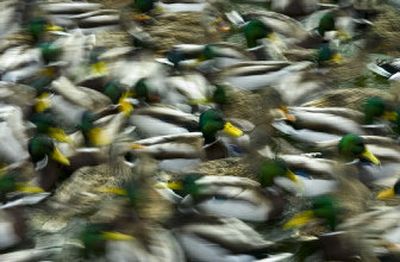Please don’t feed the ducks

This week I walked with my friend, her 4-month old, and my dog through Manito Park. The flowers in the formal garden were crazy with color, as if they’d sucked the last moments of summer into their blooms, captured it and refused to let fall take them without a fight.
Spectacular though that was, when we passed the duck pond we were even more astonished. The murky water there was surrounded by so many sleeping brown ducks neither of us spoke. Instead we simultaneously gasped and stopped moving forward. The ducks’ soft heads were curled under their wings. They were silent, and paid little, if any, attention to us. And there were a lot of them. More than 50. Maybe even more than that. Maybe 75. I’m not sure. I’m not in the habit of counting sleeping ducks.
As we stood gaping, they slept on undisturbed. They seemed to trust we would do no harm, and that made me wonder where they came from that they didn’t mind human presence. So when I got home, I called around for expert opinions.
After a few phone calls I found out that Dan Trochta, biologist for the United States Department of Fish and Wildlife, is the go-to guy around here for wild waterfowl information. I asked him where he thought these birds came from.
“Wild ducks start migrating from Canada and the Yukon when things start freezing up there,” he said. “But it’s a little early to be migrating yet. It takes a while for things to start freezing up before they head south. I would think it’ll be another month or two for the wild ducks to really start migrating from north of here”
Then he considered another possibility.
“If there’s a food source might be a few there now,” he said. “They’d probably take off to the river in the evening.”
I’d seen a boy and his father feeding ducks at Cannon Hill pond at the end of our walk. Again there were many birds, but these were all alert, headed right for the bread crusts being offered.
Here’s a bit of perhaps not so welcome news for duck feeders:
Taylor Bressler, Spokane City park operations division manager, said feeding the ducks is not a great idea.
“Everybody’s heart is in the right place, but they just don’t understand that are messing with the life cycle of these birds,” he said.
Feeding the birds food to which their digestive systems aren’t accustomed is part of a big problem at the park, and a main cause of the murky pond water, Bressler added.
“The ducks around Manito (Park) tend to stay all winter,” he said. “What you’ve got then is an over rich water, an exorcist’s green is what I call it. We are working with a company in Coeur d’Alene to get rid of the algae.”
What if you just want to give your child a chance to see the birds up close?
“If people fed in moderation I think the pond could handle that,” he said. “Just use the food as an attractant rather than a way to fatten the ducks up. There’s plenty for them to eat right around the pond. They also eat green things – grass and seedlings – the stuff that’s good for them.”
Trochta said that feeding the ducks is not ever a particularly good idea. “Kids might feed them their bubble gum,” he said.
Bressler added, “The ducks and the ponds are there for the public. The park is owned by the public. It’s your park; you should be responsible for it.”
Bressler is especially troubled by the careless way some park patrons behave around the birds.
He said he’s seen hunters bring their dogs to practice in the park, and more than once he’s witnessed a child chasing a duck.
“I feel sorry for them,” he said, “particularly the domestic waterfowl. They can’t fly. I bet at any given time we have eight or 10 domestics (ducks) plus the swans and a couple of geese.
The rest are wild birds. They can come and go as they please because they can fly.”
And fly they do. This fall, when duck population starts disappearing from the ponds, keep your eyes to the sky for one last look before winter.
“Ducks fly as a flock in migration because there’s security in numbers,” said Trochta. “A lot of times people don’t see ducks migrating because they aren’t honking like the geese, so people don’t look up.”
But if you miss them even when you are looking, don’t worry. They’re up there, Trochta said.
“Sometimes they fly at elevations of airplanes.”